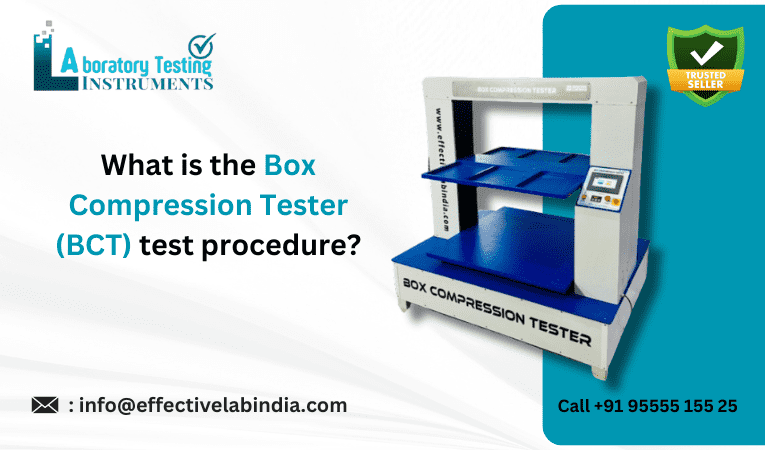Manufacturers widely use cardboard boxes in packaging and shipping to protect products during transit. These boxes withstand various stresses, including compression from stacking or handling during transport. Evaluating the compression strength of corrugated boxes or cartons is essential for evaluating their durability and quality. At Lab Testing Tools, we developed a premium-quality Box Compression Tester to meet this need. This innovative device accurately measures the compression strength of various packaging materials, ensuring that consumers receive only high-quality products.
In this article, we are going to discuss brief information about box compression testers, and why testing the compression strength of corrugated boxes is vital for paper & packaging manufacturers. Remain connected to read more about it.
Why testing the compression strength of corrugated boxes is vital?
Testing the compression strength of corrugated boxes is crucial to confirm they can resist pressure and weight during transportation without collapsing or getting damaged.
Testing corrugated boxes for compression strength is necessary for several reasons, including:
- Ensuring product safety: Corrugated boxes frequently ship fragile or delicate items, and failure to resist compression can damage the contents. By testing the boxes’ compression strength, manufacturers ensure their products are transported securely and arrive in good condition.
- Meeting regulatory requirements: Many countries have regulations governing packaging and shipping, and these frequently require that boxes meet specific strength and durability standards. Testing cardboard boxes for compression strength can help ensure compliance with these regulations.
- Reduction in shipping errors: If boxes fail during transportation, additional boxes may need to be used to replace damaged ones, resulting in additional shipping costs. Ensuring that boxes have adequate compression strength allows manufacturers to minimize the risk of product damage and reduce the need for additional packaging.
- Improving customer satisfaction: Customers expect their products to arrive in good condition, and failure to meet these expectations can result in discontent and negative reviews. By testing cardboard boxes for compression strength, manufacturers can improve customer satisfaction by ensuring that their products arrive intact.
These reasons indicate that you should test the cardboard boxes accurately to ensure the quality of the materials delivered. By using the laboratory testing instrument known as the box compression tester, you can effectively tackle the issue of compressed boxes. Let’s briefly explore the features of this quality testing equipment.
Evaluate the maximum load capacity of boxes by using the Box Compression Tester, a reliable laboratory testing instrument.
The Box Compression Tester is a reliable and accurate laboratory instrument specifically designed to evaluate the compression strength of corrugated boxes. It features a microprocessor-based display that provides accurate and consistent test results. This box compression testing instrument is equipped with uniform compression force to ensure precise measurements.
The TARE and Peak Hold features enhance the accuracy and continuity of test results. This testing device features over-travel protection and is built with a sturdy base plate and sturdy construction to enhance its durability.
The bright LED display and feather touch controls make it simple to operate. This box- testing instrument is available in a computerized model and various platform sizes with various load cell capacities.
An optional printer feature is also available for record-keeping purposes. Overall, the Lab testing instrument Box Compression Tester is an essential tool for ensuring the quality and reliability of corrugated boxes used for packaging and shipping.
Importance of a Box Compression Tester in Packing
Now, let’s take a moment to review the features and technical specifications of this quality testing equipment.
Features of Laboratory testing instruments box compression tester digital
- Microprocessor-based display for accurate testing results
- Testing results are highly precise when subjected to a consistent compression force.
- Tare and Peak Hold Facility Available
- Over travel protection
- Strong base plate with a tough structure
- bright led display
- Feather Touch Control
- Available in Computerized model too
- Available in various platform sizes and loads. Cell Capacity Optional Printer Facility
Technical specifications of Laboratory testing instruments box compression tester digital
- Type: Compression testing machine
- Maximum Load Capacity: 500 kg (kilogram-force)
- Display: Digital LED display for easy reading and accuracy
- Accuracy: ± 2% of the full scale (verified with master load)
- Resolution: 200 grams (least count)
- power Supply: 220V, single-phase, 50 Hz
- Platform Dimensions: 450 mm x 450 mm (suitable for various box sizes)
- Testing speed is adjustable, ranging from 12.5±2.5 mm per minute.
- Motor: 1 HP, three-phase motor with 1350 RPM Compliance Standards: EN ISO 12048, ISO 2234:2015 ASTM D642, and ASTM D4169, standards for packaging testing.
With these high-end features and technical specifications, manufacturers of the paper & packaging industry can deliver quality materials to consumers and ensure quality packaging. Now, let us discuss the working process of BCT.
Steps to conduct BCT on cardboard boxes
The Box Compression Test (BCT) is a standardized method for measuring the compression strength of cardboard boxes. Below we have listed some of the vital steps to perform this procedure.
- To start a box compression test, prepare the specimen and place it securely on the machine’s platform.
- Make sure the sample is appropriately aligned using the designated markers, which will help ensure accurate and reliable test results.
- Once appropriately aligned, lower the compression plate towards the specimen by using the rotary switch.
- Use the fast runner function to set the plate speed to 50 mm/min for quicker movement.
- To ensure there are no air gaps between the plate and the sample, apply a preliminary load of 1 to 2 kg before starting the test. This initial load helps create a snug fit and precise testing conditions.
By following these points, one can accurately test the compression strength of boxes easily. For more information about the price of the Box Compression Tester or to request a FREE Sample TESTING SESSION with this equipment, please contact us at +91 9555515525 or email us at info@effectivelabindia.com. Our technical experts will guide you well regarding the product question.




